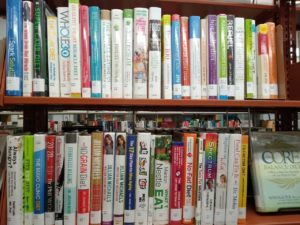Who’s not thinking about health these days? You can’t walk down the street without hearing the word ‘coronavirus.’ But our health is much more than a temporary epidemic; our health is a life-long job, one we need to pay attention to. Luckily for all of us, the Library is a good first stop for information on medical developments, be they general in nature or specific to ourselves.
From the Library website, just click ‘resources,’ then ‘databases,’ then ‘Health and Medicine.’ There you will find a pair of useful resources: the first is a guide to the Affordable Care Act, which includes the Act itself and links to resources to help people find a marketplace. The second is Medline, where you can learn about the latest treatments, look up information on a drug or supplement, or view medical videos or illustrations. You can also get links to the latest medical research on your topic or find out about clinical trials on a disease or condition.
Don’t want to click around databases or the internet? Lots of people don’t, and the library is still the place to come. There are shelves of books about specific conditions, diet, exercise – everything we need to be healthy in body, mind and soul. AND, when you check out a book, you can keep it for three weeks and really digest (excuse me) the information within.

For a broader look at health in general, take a look at:
The Human Body Book by Steve Parker – an illustrated guide to its structure, function, and disorders. A nuts and bolts look at what’s inside you (special credit if you already know where the lacrimal bone is.)
Mayo Clinic Family Health Book – This is the ultimate home medical reference. All the info you need on health and not-health, from Abdominal aortic aneurysm (you don’t want one) to Zollinger-Ellison syndrome. Check out the visual guide (almost as good as The Human Body Book) and Section III, Healthy Adults, which will give you tips on staying healthy as you age, from diet and fitness to exams and vaccinations.
For a more discursive and, arguably, more entertaining book, check out Bill Bryson: The Body, a Guide for Occupants, available as a book for your eyes (in regular and large print) or an audio book for your ears. Bryson describes our various systems, how they work and how they interact.
There are a bazillion more titles at the Library, so come on in and find what you need to be well or get better and stay well. And remember, you can access the Library’s holdings and databases from the comfort of your own home. Just go to ajpl.org to find the library’s catalog and links to the databases mentioned above.